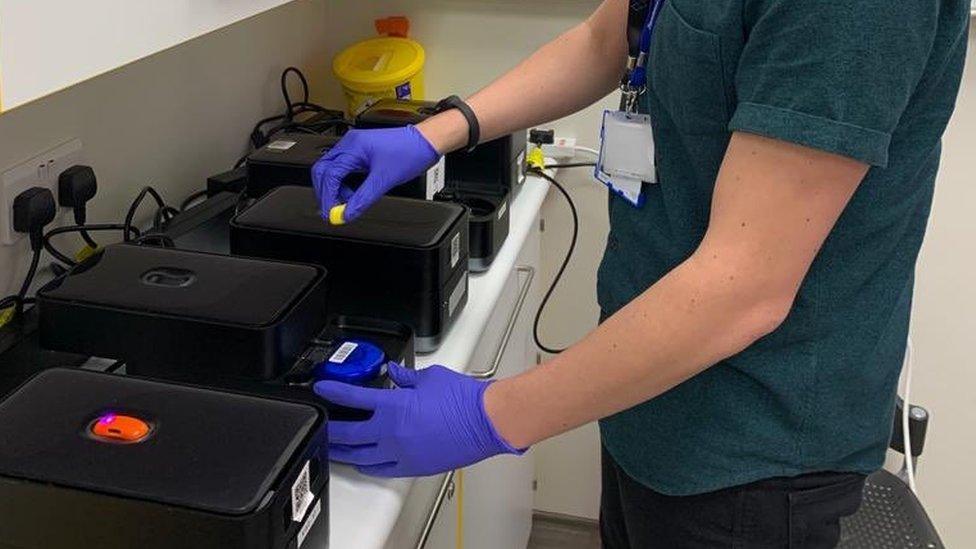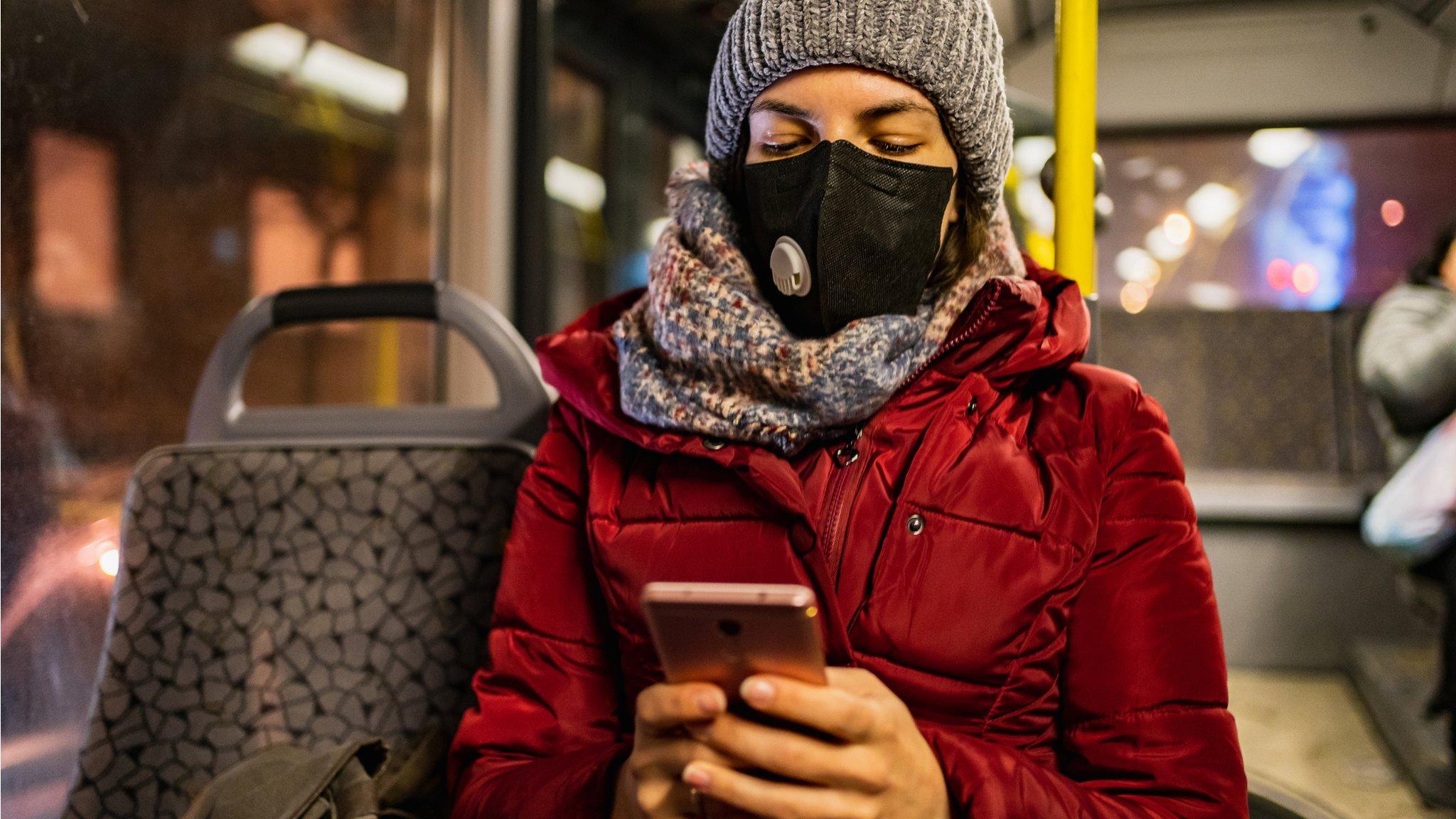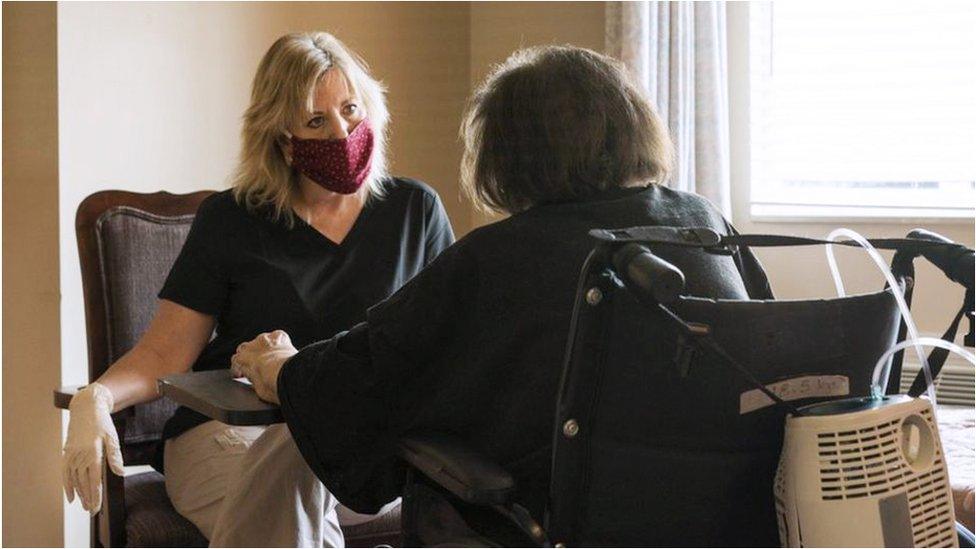Coronavirus: New 90-minute tests for Covid-19 and flu 'hugely beneficial'
- Published

Thousands of DNA test machines will be rolled out in hospitals from September
New 90-minute tests that can detect coronavirus and flu will be rolled out in hospitals and care homes from next week.
The "on-the-spot" swab and DNA tests will help distinguish between Covid-19 and other seasonal illnesses, the government said.
The health secretary said this would be "hugely beneficial" over the winter.
Currently, a third of tests take longer than 24 hours to process.
The announcement comes as the government pushed back a July target to regularly test all care home staff and residents - a key move to identify so-called silent spreaders, those who are infected but do not show symptoms.
This is unlikely to be achieved until September because the number of testing kits has become more limited.
The government said almost half a million of the new rapid swab tests, called LamPORE, will be available from next week in adult care settings and laboratories, with millions more due to be rolled out later in the year.
Additionally, thousands of DNA test machines, which have already been used in eight London hospitals and can analyse nose swabs, will be available across NHS hospitals from September.
Around 5,000 machines, supplied by DnaNudge, will provide 5.8 million tests in the coming months, the Department for Health said.
There is currently no publicly available data on the accuracy of the new tests.
But Sir John Bell, Regius Professor of Medicine at Oxford University, who has been advising the government on tests, said they produced the same "sensitivity" as the current lab-based tests.

Good news - but breakthrough will be judged on results

The breakthrough on testing is important for a number of reasons - not just because one has the ability to test for flu and other viruses too.
Firstly, speed. The fact the tests do not have to be sent off to a lab means the processing times are much quicker.
In hospital, most tests - 9 in 10 - are currently turned around in 24 hours.
But those done in the community via regional drive-through centres, using postal kits and mobile units, tend to take longer because they have to be sent away to labs for processing.
Results are only returned in 24 hours in half of cases.
The two tests will also help to increase capacity.
Currently around 300,000 tests a day can be processed, but the aim is to get to 500,000.
But this is all dependent on delivery. The DNA test will not be rolled out until September, while the LamPORE test is ready to go now but is still waiting for approval from regulators - which the government is expecting by the end of the week.
The government has also not published full details on the accuracy of the tests.
The testing system is complex and is reliant on many different factors, including multiple supply chains and having the workforce to carry them out.
If just one thing goes wrong - as the roll-out of the whole care home testing system shows - delivery can fall short of ambition.

"A device this small is effectively a laboratory" - Prof Chris Toumazou, of DnaNudge, explains how the new test works
Health Secretary Matt Hancock described these latest innovations as a "big step forward" and said the government was on target to reach 500,000 tests a day by the end of October.
He said the new technologies could be used in settings such as schools and across the community where "we want to test people who don't have symptoms so we can find out where the virus is".
Mr Hancock added: "The fact these tests can detect flu as well as Covid-19 will be hugely beneficial as we head into winter, so patients can follow the right advice to protect themselves and others."
First Minister Nicola Sturgeon said Scotland would receive a share of the new tests - but its own clinical advisers would look carefully at their accuracy and efficacy before they are made available.
Matt Hancock says test results being delivered more quickly would keep "rates of infection down”.
Dame Anne Johnson, professor of infectious disease and epidemiology at University College London, told BBC Radio 4's Today programme the new tests were "great news" but part of a wider system which needed to act rapidly overall. Rapid diagnosis was useful, but the most important thing was for people to self isolate if they felt ill, she said.
Sir Paul Nurse, director of the Francis Crick Institute and a member of Scientists for Labour, said the government needed to "treat the public as adults" in Covid-19 communications.
"We need openness, transparency, scrutiny, and a leadership of people taking responsibility for the decision-making," he said.
The testing news comes as:
Scotland's First Minister Nicola Sturgeon has said she won't hesitate to reintroduce lockdown restrictions if Covid-19 starts to get "out of control"
Owners of restaurants, pubs and hairdressers in Leicester - the first UK city to have a localised lockdown - have spoken of their "relief" at being able to open for the first time since March
A government scheme to encourage people to visit restaurants, cafes and pubs, across the UK has now launched - giving customers of 72,000 establishments 50% off meals bought from Monday to Wednesday in August
Groups of up to 30 people can now meet in Wales and pubs, cafes and restaurants can serve people inside as the lockdown rules were further eased on Monday
There might never be a silver bullet treatment for coronavirus, according to the director general of the World Health Organisation, Dr Tedros Adhanom Ghebreyesus
Coronavirus tests are currently carried out at drive-through or walk-in sites as well as at hospitals for patients and some NHS workers.
Home testing kits can also be delivered to someone's door so that people can test themselves. Swab samples are analysed at a laboratory before the result is passed on to the individual.
Unlike other seasonal illnesses, those infected with Covid-19 are required to self-isolate for 10 days.

SOCIAL DISTANCING: What are the rules now?
LOOK-UP TOOL: How many cases in your area?

Regular testing of care home residents and staff was meant to have started on 6 July but officials said this might not be in place until the end of the first week of September.
A spokeswoman for the Department of Health said: "A combination of factors have meant that a more limited number of testing kits, predominantly used in care homes, are currently available for asymptomatic re-testing and we are working round the clock with providers to restore capacity."
Last month, the government withdrew one brand of home-testing kits used in care homes over safety concerns.
A further nine coronavirus deaths were reported on Monday, taking the total number of people who have died with the virus in the UK to 46,210. The latest government figures also showed there were 938 new confirmed cases.



CARE HOMES: The forgotten frontline?
FORT SALEM: Fancy some escapism? Binge-watch the new series


Have you been tested for coronavirus? Share your experiences by emailing haveyoursay@bbc.co.uk, external.
Please include a contact number if you are willing to speak to a BBC journalist.
WhatsApp: +44 7756 165803
Tweet: @BBC_HaveYourSay, external
Send pictures/video to yourpics@bbc.co.uk, external
Please read our terms & conditions and privacy policy
- Published27 July 2020

- Published3 May 2022

- Published31 July 2020
